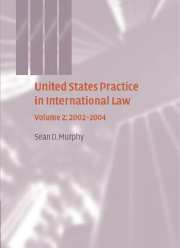Book contents
- Frontmatter
- Contents
- Foreword by Judge Stephen M. Schwebel
- Acknowledgments
- Table of Periodical Abbreviations
- Table of Cases
- Table of U.S. Statutes
- Table of Treaties
- I General International and U.S. Foreign Relations Law
- II State Diplomatic and Consular Relations
- III State Jurisdiction and Immunities
- IV State Responsibility and Liability
- V International Organizations
- VI International Oceans, Environment, Health, and Aviation Law
- VII International Economic Law
- VIII International Human Rights
- IX International Criminal Law
- X Use of Force and Arms Control
- XI Settlement of Disputes
- XII Private International Law
- Annex
- Index
VI - International Oceans, Environment, Health, and Aviation Law
Published online by Cambridge University Press: 10 December 2009
- Frontmatter
- Contents
- Foreword by Judge Stephen M. Schwebel
- Acknowledgments
- Table of Periodical Abbreviations
- Table of Cases
- Table of U.S. Statutes
- Table of Treaties
- I General International and U.S. Foreign Relations Law
- II State Diplomatic and Consular Relations
- III State Jurisdiction and Immunities
- IV State Responsibility and Liability
- V International Organizations
- VI International Oceans, Environment, Health, and Aviation Law
- VII International Economic Law
- VIII International Human Rights
- IX International Criminal Law
- X Use of Force and Arms Control
- XI Settlement of Disputes
- XII Private International Law
- Annex
- Index
Summary
OVERVIEW
The United States is a party to numerous bilateral and multilateral treaties in the fields of oceans, environment, health and aviation law and, during 2002–2004, those agreements operated both to empower the United States in its relations with other states, and to constrain the United States in the conduct of its own affairs. At the same time, several major ocean or environmental treaties that were signed by the United States, and that entered into force prior to 2002, remained unratified as of the end of 2004, notably the UN Convention on the Law of the Sea (entered into force Nov. 16, 1994), the amendment to that convention addressing deep sea mining (entered into force July 28, 1996), the Basel Convention on the Control of the Transboundary Movement of Hazardous Wastes (entered into force May 5, 1992), and the UN Convention on Biological Diversity (entered into force Dec. 29, 1993). Other major environmental agreements that were signed by the United States prior to 2002, and that entered into force during 2002–2004, also remained unratified by the United States, such as the Rotterdam Convention on Prior Informed Consent Procedure for Certain Hazardous Chemicals and Pesticides in International Trade (entered into force Feb. 24, 2004), the Long-Range Transboundary Air Pollution (LRTAP) Protocol on Persistent Organic Pollutants (entered into force Oct. 23, 2003), and the UN Stockholm Convention on Persistent Organic Pollutants (entered into force May 17, 2004).
- Type
- Chapter
- Information
- United States Practice in International Law , pp. 119 - 151Publisher: Cambridge University PressPrint publication year: 2006



